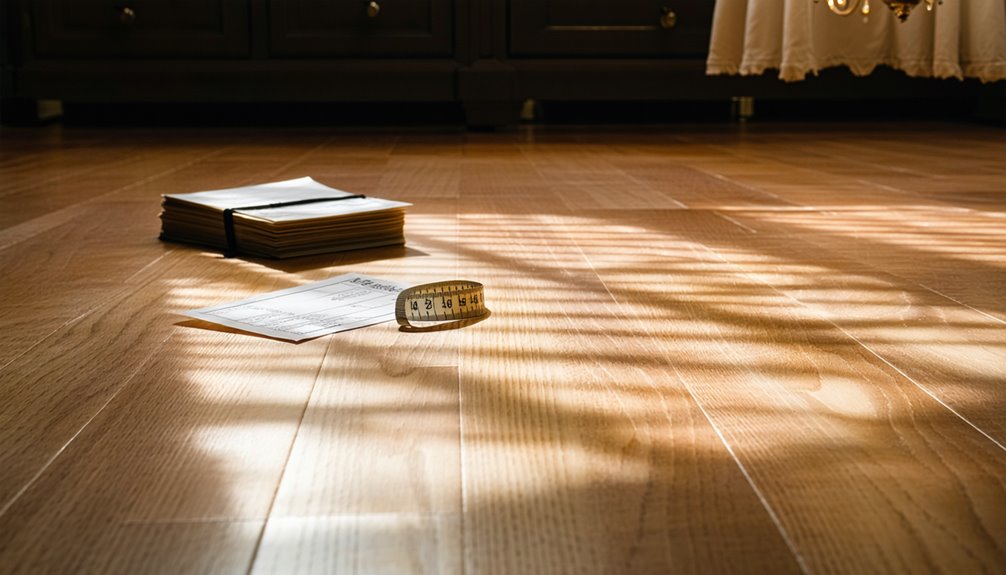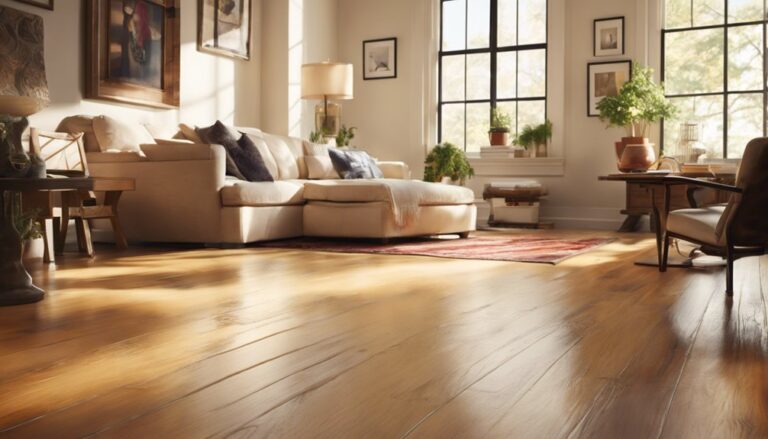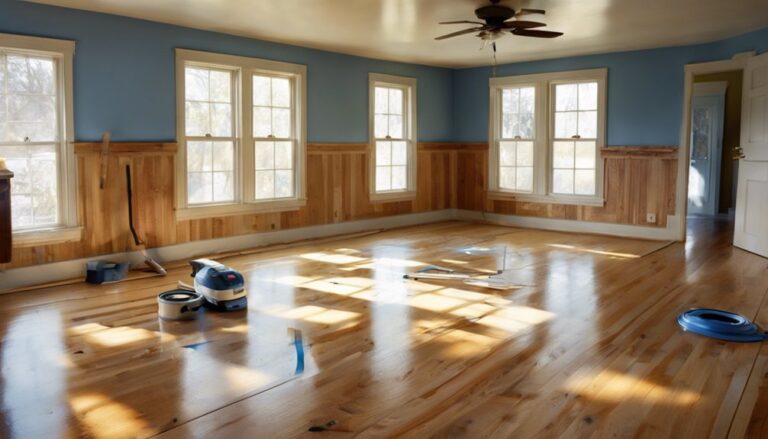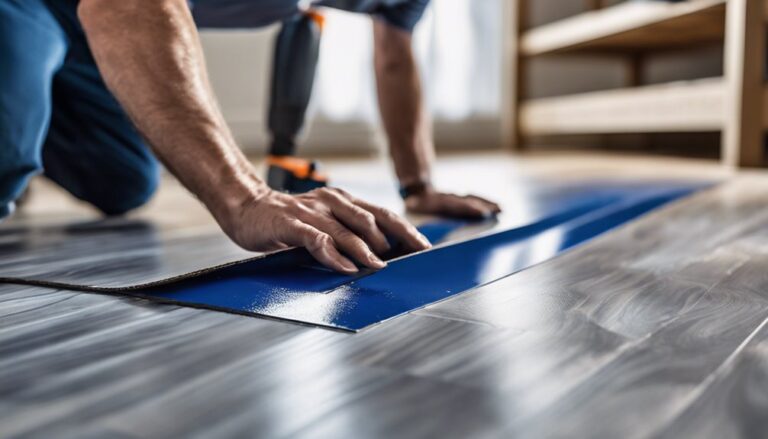Installing hardwood floors generally costs between $6 and $12 per square foot. Factors like the type of wood, your chosen installation method, and the complexity of your room's layout can all affect the price. For instance, exotic woods are usually pricier than domestic options. Don't forget to take into account additional costs for materials, such as underlayment and trim, plus budgeting an extra 10-20% for unexpected expenses. If you're leaning toward DIY, remember it can save money but may require more time and skill. There's a lot to explore regarding installation choices and costs, so keep going to learn more!
Factors Affecting Cost
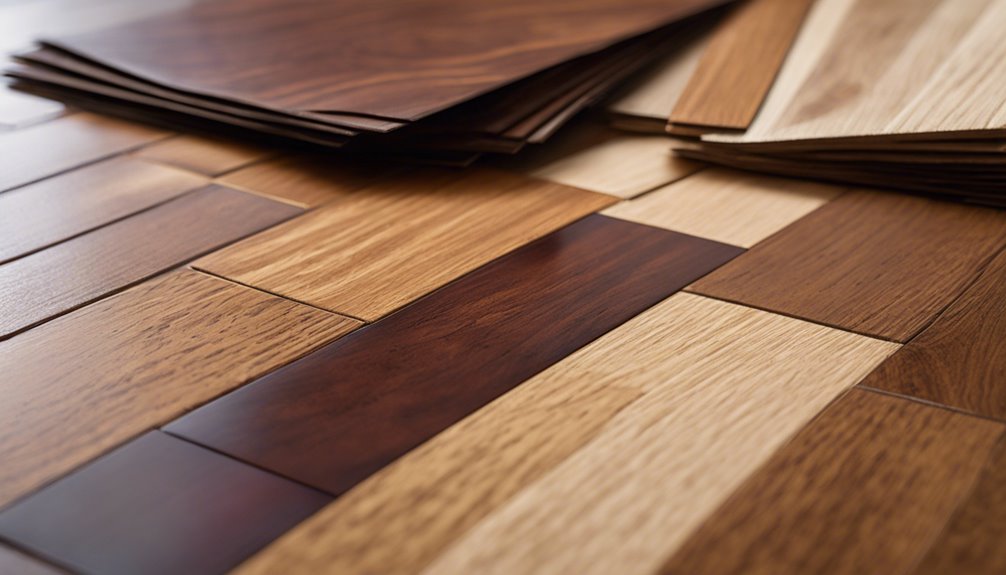
When you're considering installing hardwood floors, several factors can influence the overall cost. One of the biggest determinants is the installation techniques you choose. For instance, nail-down methods might be less labor-intensive than glue-down options, affecting your expenses. Additionally, the complexity of your room layout can also play a role; more intricate designs may require skilled labor, raising costs further. Don't forget about flooring maintenance, either. While hardwood is durable, it does require regular upkeep, such as refinishing and cleaning, which can add to your long-term expenses. By understanding these factors, you can make informed decisions that align with both your budget and your vision for a beautiful, free-flowing space.
Types of Hardwood Flooring
Choosing the right type of hardwood flooring is essential for both aesthetics and functionality in your home. You've got two main options: solid hardwood and engineered hardwood. Solid hardwood consists of solid pieces of wood, offering durability and a classic look. It can be refinished multiple times, extending its lifespan and maintaining its beauty. On the other hand, engineered hardwood features a core of plywood with a veneer of solid wood on top. This makes it more resistant to moisture and temperature changes, making it ideal for basements or areas with fluctuating humidity. Both options have their benefits, so consider your lifestyle, environment, and design preferences to find the perfect fit for your space.
Average Installation Costs
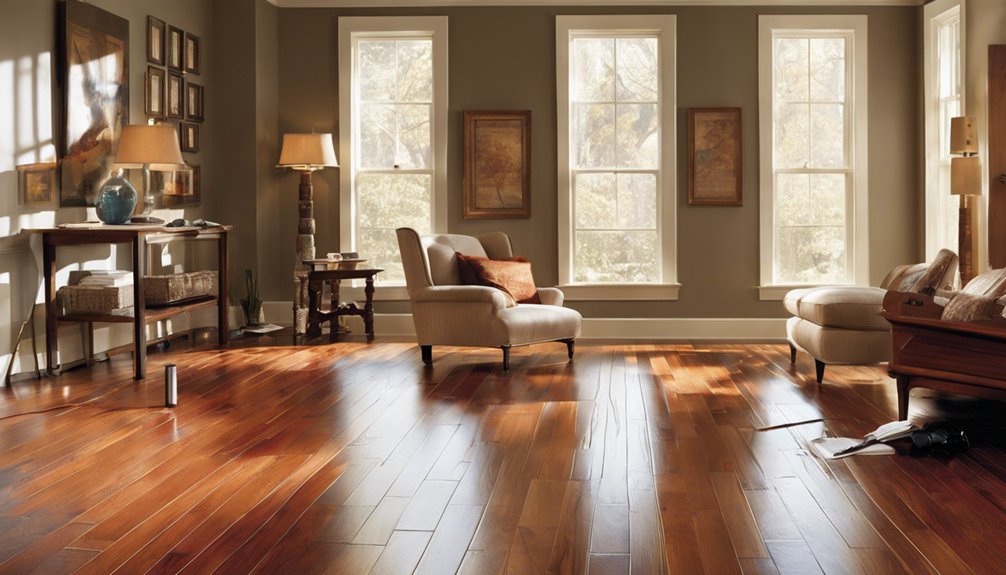
Installing hardwood floors can vary considerably in cost, influenced by factors like the type of wood you choose and your location. On average, you might expect to pay between $6 to $12 per square foot for installation. This price could rise based on your material choices; for instance, exotic woods will cost more than domestic options. Additionally, the installation techniques you opt for—like nail-down, glue-down, or floating—can affect labor costs. If you're going for a more complex installation pattern, such as herringbone or diagonal, it might add to the overall expense. Understanding these elements helps you budget effectively and guarantees you get the floor of your dreams without breaking the bank.
Additional Expenses to Consider
Although you may have a budget for the hardwood floors themselves, it's important to contemplate additional expenses that can arise during the installation process. You might need to purchase additional materials such as underlayment, adhesives, or trim, which can add to your overall costs. Don't forget about tools if you're doing it yourself; renting or buying them can be pricey.
Once your floors are installed, consider the ongoing maintenance costs. Hardwood floors require regular cleaning and occasional refinishing, which can impact your budget over time. Additionally, you may want to invest in area rugs or furniture pads to protect your investment. Taking these factors into account will help guarantee you're financially prepared for the entire project.
DIY vs. Professional Installation
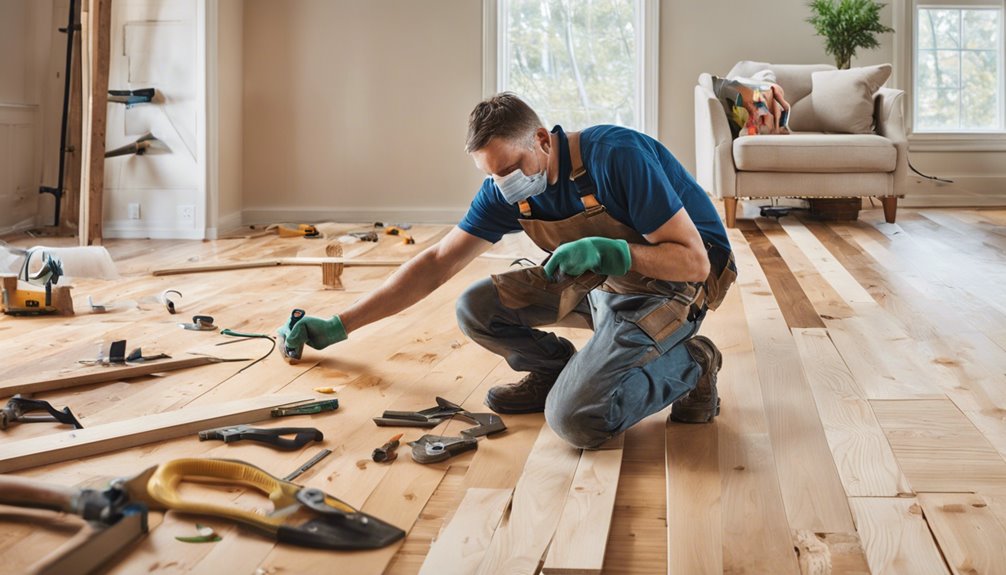
When considering hardwood floor installation, you'll need to weigh the costs, skill level, and time commitment of both DIY and professional options. While tackling the project yourself can save money, it requires a certain level of expertise and can take considerably longer. On the other hand, hiring a professional guarantees quality results but comes with a higher price tag.
Cost Comparison
Deciding between DIY installation and hiring a professional can considerably impact your overall costs for hardwood flooring. If you choose to go the DIY route, you'll save on labor costs, but you'll need to invest time and effort into learning the process. Plus, consider any potential mistakes that might arise, leading to extra expenses. On the other hand, hiring a professional guarantees a polished finish and often includes installation warranties, offering peace of mind. Professionals might also guide you toward hardwood alternatives that fit your budget and style. Ultimately, weigh the initial savings against the long-term benefits when deciding which path aligns best with your freedom and financial goals.
Skill Level Required
Choosing between DIY installation and hiring a professional often boils down to the skill level required for each approach. You need to assess your own skills and comfort with installation techniques to make the right choice. Here's a quick skill assessment to guide you:
- Basic DIY Skills: If you're handy with tools and have some experience, you might tackle the project yourself.
- Intermediate Skills: You'll need to understand flooring types and specific installation techniques like measuring and cutting.
- Advanced Skills: For complex layouts or specialty materials, hiring a professional guarantees a high-quality finish.
Ultimately, evaluate your confidence and abilities before deciding. This choice will impact both the quality of your floor and your overall satisfaction.
Time Investment Factors
While the allure of saving money with a DIY installation might be tempting, you should also consider the time commitment involved. The installation timeline for hardwood floors can vary greatly based on your skill level and the size of the area. DIY projects often require extensive flooring preparation, including removing old flooring, ensuring a level subfloor, and acclimating the wood. This can take several days, especially if you're juggling other responsibilities. On the other hand, hiring professionals can streamline the process, reducing the installation timeline to just a few days. Weighing the time investment against potential savings is vital in deciding whether to go the DIY route or hire experts for a smoother experience.
Cost Breakdown by Region
When evaluating the cost to install hardwood floors, it's essential to recognize that regional differences can greatly impact your budget. Understanding regional price variations and local market trends can help you prepare for expenses more effectively.
Here are some factors to keep in mind based on your location:
- Northeast: Generally higher installation costs due to labor and demand.
- Midwest: More affordable options, but quality can vary notably.
- South and West: Prices can fluctuate widely, often influenced by climate and availability.
Long-Term Value and Benefits
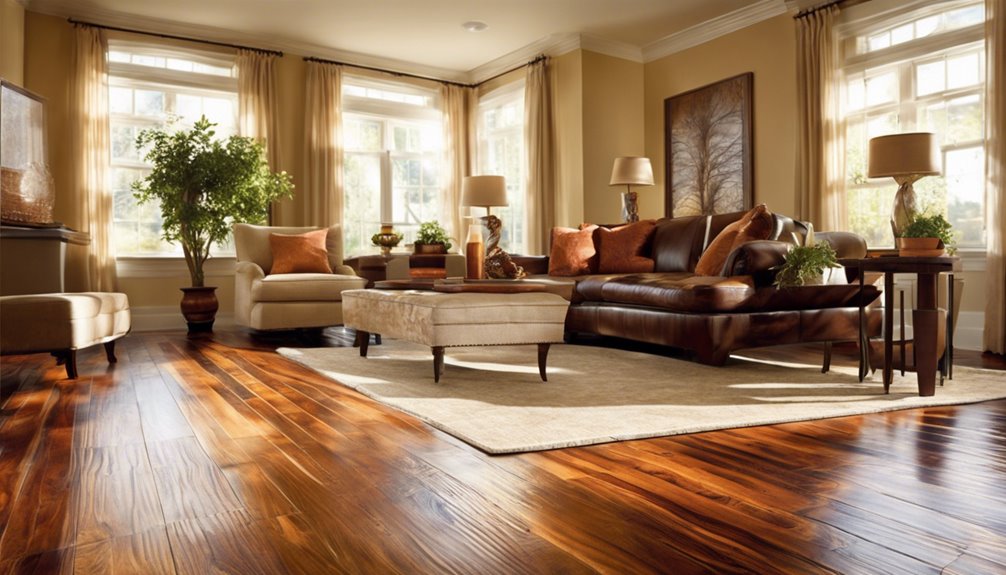
When you choose hardwood floors, you're not just investing in style; you're also boosting your home's value considerably. Their durability and longevity mean you won't have to replace them often, saving you money in the long run. Plus, the aesthetic appeal they provide enhances your space, making it more inviting and timeless.
Increased Home Value
Investing in hardwood floors not only enhances the aesthetic appeal of your home but also greatly boosts its long-term value. By choosing hardwood, you're not just making a design decision; you're considerably increasing your home equity and potential resale value. Here's how:
- High Demand: Hardwood floors are a sought-after feature, attracting potential buyers.
- Longevity: With proper care, hardwood can last for decades, making it a wise investment.
- Market Appeal: Homes with hardwood floors often sell faster and at higher prices.
Incorporating hardwood into your home can be a game-changer. The benefits extend beyond immediate beauty, ensuring that when it's time to sell, you'll reap the rewards of your investment.
Durability and Longevity
Choosing hardwood floors not only enhances your home's value but also offers remarkable durability and longevity. With proper hardwood maintenance, these floors can last for generations, making them a smart investment. Unlike other flooring options, hardwood can withstand daily wear and tear, resisting scratches and dents effectively. When you notice signs of aging, floor refinishing can restore their original beauty, allowing you to enjoy your investment longer without needing a full replacement. This process typically involves sanding down the surface and applying a fresh finish, extending the life of your floors considerably. By opting for hardwood, you're not just choosing a flooring material; you're making a choice for lasting quality and freedom from frequent upgrades.
Improved Aesthetic Appeal
Although you might consider various flooring options, hardwood floors stand out for their unparalleled aesthetic appeal, which can transform any space. This choice not only enhances the look of your home but also reflects your personal style. With hardwood, you can easily adapt to changing design choices and aesthetic trends.
- Versatility: Complements both modern and traditional decor.
- Timelessness: Remains stylish and sought after, increasing your home's value over time.
- Natural Beauty: Each plank offers unique grains and colors, creating a one-of-a-kind look.
Investing in hardwood floors gives you the freedom to express your design vision while ensuring your space looks elegant and inviting for years to come.
Tips for Budgeting and Planning
When planning to install hardwood floors, it's essential to outline a realistic budget to avoid unexpected costs. Start by researching various budgeting strategies, like setting aside 10-20% for unforeseen expenses. Determine the total square footage you'll need, as this directly impacts your material and labor costs. Next, create a planning timeline that accommodates your schedule and any necessary preparations, such as removing old flooring. Don't forget to factor in additional costs for underlayment, trim, and installation. By being thorough in your budgeting and planning, you'll not only save money but also guarantee a smoother installation process. Embrace the freedom of knowing you've planned wisely for your beautiful new hardwood floors!
Frequently Asked Questions
Can I Install Hardwood Floors Over Existing Flooring?
Yes, you can install hardwood floors over existing flooring, but you'll need to do an existing flooring assessment first. Make sure the current floor is level, clean, and in good condition. If it's carpet or has too much moisture, it might not be suitable. You'll also want to check the height to avoid door clearance issues. Once you've assessed it, hardwood flooring installation can enhance your space beautifully!
What Is the Lifespan of Hardwood Flooring?
Did you know that hardwood flooring can last over 100 years with proper care? When it comes to hardwood durability, maintaining your floors is key to achieving that impressive flooring longevity. Regular cleaning, avoiding excessive moisture, and using protective pads under furniture can greatly extend the life of your hardwood. So, if you're looking for a long-lasting flooring solution, investing in quality hardwood might just be your best bet!
How Do I Maintain Hardwood Floors After Installation?
To maintain your hardwood floors after installation, it is crucial to use proper cleaning techniques. Regularly sweep or vacuum to remove dirt and debris. For deeper cleaning, use a damp mop with a pH-neutral cleaner. Applying protective finishes like polyurethane can shield your floors from scratches and spills. Avoid harsh chemicals that could damage the finish. With consistent care, your hardwood floors will maintain their beauty and longevity, allowing you to enjoy your space freely.
Are There Eco-Friendly Hardwood Flooring Options Available?
Finding eco-friendly hardwood flooring options is like discovering a hidden gem in a forest. You'll want to look for sustainable materials, such as bamboo or reclaimed wood, which minimize environmental impact. These choices not only help reduce deforestation but also promote responsible sourcing. By choosing eco-friendly flooring, you're making a conscious decision that benefits the planet, creating a beautiful space in your home while embracing a more sustainable lifestyle.
What Are the Best Hardwood Species for High-Traffic Areas?
When choosing hardwood species for high-traffic areas, consider oak for its exceptional durability. It withstands heavy foot traffic and resists wear effectively. Maple, on the other hand, offers great resistance to dents and scratches, making it another excellent choice. Both species can maintain their beauty even in bustling spaces. If you want flooring that lasts while still looking great, these options are your best bet for balancing style and practicality.

